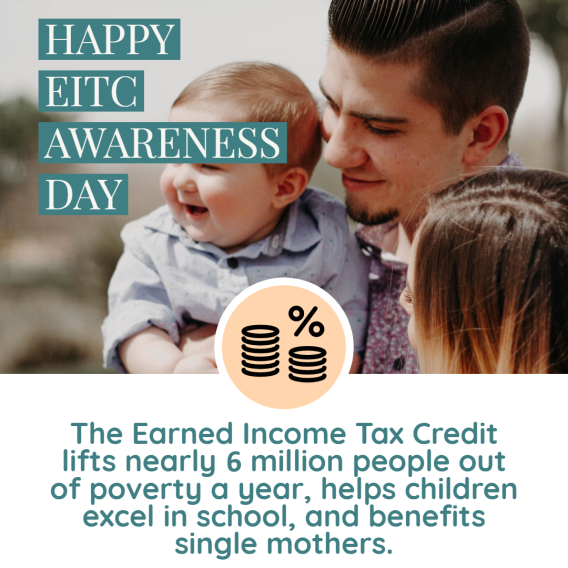
People who are experiencing homelessness face serious challenges that may prevent them from claiming the Earned Income Tax Credit (EITC) and the Child Tax Credit (CTC). Without a stable place to live, people who are homeless may not get mail regularly, making it harder to receive the documents needed to file a tax return and claim tax credits. Sometimes, people who are homeless may have difficulty keeping track of documents they’ve received, or their documents may have been destroyed. Outreach efforts should include messages letting people experiencing homelessness know that they can still file a tax return and claim tax credits they are eligible for.
CONNECT WITH
- Food banks and soup kitchens
- Shelters and transitional housing programs
- Job placement programs
- Health clinics
- Local human services agencies
STRATEGIES
1. Let people know they do not need a permanent address to file a tax return and claim tax credits.
Shelters or other service providers, such as health care clinics or drop-in day centers, may allow residents or clients to use their address for tax purposes.
Organizations working with people experiencing homelessness should contact their IRS Territory Manager to become an IRS Trusted Partner so they can receive multiple refund checks at their address. This will help prevent the IRS from flagging organizations for potential fraud which could delay the delivery of payments.
Organizations receiving tax refunds for people should also make sure their mail-handling procedures are secure and provide a way for refund checks to reach recipients safely. Some organizations require mail to be opened in front of two staff members so that both can verify that checks were received. People who are not staying in a shelter may be able to use a trusted relative’s or friend’s address.
2. Help people experiencing homelessness get replacement tax documents.
Inform people that they can file taxes and claim tax credits even if they lost or did not receive their W-2 or 1099 forms.
If people cannot get a copy of their documents from their employer, they can complete Form 4852, Substitute for Form W-2, Wage and Tax Statement or Form 1099-R, Distributions From Pensions, Annuities, Retirement or Profit-Sharing Plans, IRAs, Insurance Contracts, etc. This form requests information about wages and taxes withheld, so it is helpful to have documentation, such as a final pay stub, to complete it. Those without a final pay stub may still be able to fill out the form by estimating their earnings.
Organizations can help people who need a copy of their previous tax return get one, or refer people to a local free tax preparation site that can help prepare a substitute Form W-2 (confirm that the site does this before sending people there).
See How to file taxes if you are experiencing homelessness for more information.
3. Enlist organizations serving people who are experiencing homelessness.
Partner with food banks, soup kitchens, shelters, places of worship, transitional housing programs and local human services agencies that work with people who are unhoused. Work with shelters to set up free onsite tax filing clinics. Engage job placement assistance programs for people experiencing homelessness in tax credit outreach. They can extend their efforts by informing employers about the credits and encouraging them to share information with all employees.

4. Explore “street newspapers.”
Street newspapers raise public awareness about poverty and homelessness by publishing articles by people experiencing homelessness or formerly homeless, advocates, and professional writers. They are often sold by people who are unhoused. Outreach campaigns can encourage publishers to inform sellers about the EITC and CTC, write stories about the tax credits, print the locations of local VITA sites, and place advertisements to recruit free tax preparation volunteers. Find a local street newspaper.
5. Connect with your city’s “Plan to End Homelessness.”
Many communities have developed strategic plans to end homelessness. Enlist participating groups in tax credit outreach activities that connect people to resources to use free tax filing and claim tax benefits they are eligible for. Do an online search to find out if your state or city has a “Plan to End Homelessness.”
6. Share information about the 2021 expanded Child Tax Credit and expanded Earned Income Tax Credit.
The 2021 American Rescue Plan included multiple temporary one-year tax credit changes. The 2021 expanded Child Tax Credit is worth up to $3,600 for each child under 6 years old, and $3,000 for each child between 6 and 17 years old. The 2021 expanded EITC is worth up to $1,500 for workers not raising children or up to $6,700 for workers raising children in their home.
People who were eligible for the 2021 expanded Child Tax Credit or the 2021 expanded Earned Income Tax Credit and didn’t claim them can file a 2021 tax return by April 18, 2025. Learn more about filing prior years taxes.
ADDITIONAL RESOURCES
Contact organizations that have state or local affiliates to find local groups providing services for people experiencing homelessness.
- National Coalition for the Homeless, (202) 462-4822
- National Alliance to End Homelessness, (202) 638-1526
- National Law Center on Homelessness & Poverty, (202) 638-2535
- National Coalition for Homeless Veterans, (800) VET-HELP (838-4357)
- State Coordinators for the Education of Children and Youth Experiencing Homelessness
RELATED TOPICS







